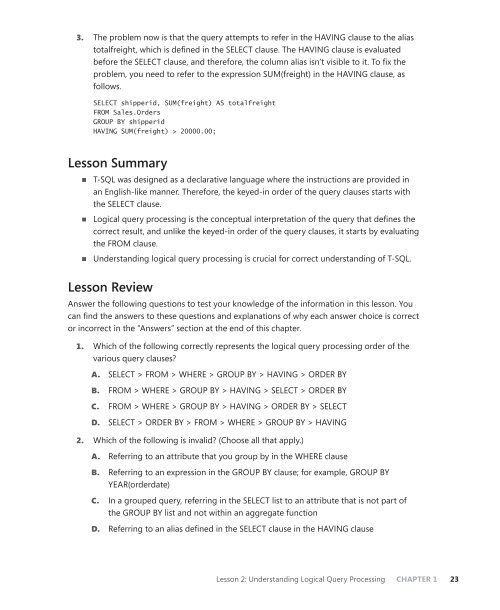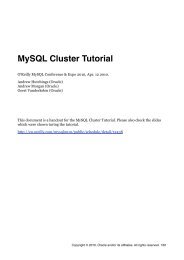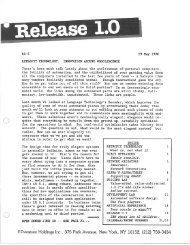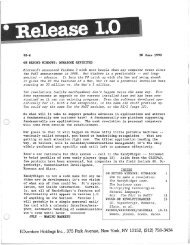Training Kit (Exam 70-461): Querying Microsoft ... - Cdn.oreilly.com
Training Kit (Exam 70-461): Querying Microsoft ... - Cdn.oreilly.com
Training Kit (Exam 70-461): Querying Microsoft ... - Cdn.oreilly.com
Create successful ePaper yourself
Turn your PDF publications into a flip-book with our unique Google optimized e-Paper software.
3. The problem now is that the query attempts to refer in the HAVING clause to the alias<br />
totalfreight, which is defined in the SELECT clause. The HAVING clause is evaluated<br />
before the SELECT clause, and therefore, the column alias isn’t visible to it. To fix the<br />
problem, you need to refer to the expression SUM(freight) in the HAVING clause, as<br />
follows.<br />
SELECT shipperid, SUM(freight) AS totalfreight<br />
FROM Sales.Orders<br />
GROUP BY shipperid<br />
HAVING SUM(freight) > 20000.00;<br />
Lesson Summary<br />
■■ T-SQL was designed as a declarative language where the instructions are provided in<br />
an English-like manner. Therefore, the keyed-in order of the query clauses starts with<br />
the SELECT clause.<br />
■■ Logical query processing is the conceptual interpretation of the query that defines the<br />
correct result, and unlike the keyed-in order of the query clauses, it starts by evaluating<br />
the FROM clause.<br />
■■ Understanding logical query processing is crucial for correct understanding of T-SQL.<br />
Lesson Review<br />
Answer the following questions to test your knowledge of the information in this lesson. You<br />
can find the answers to these questions and explanations of why each answer choice is correct<br />
or incorrect in the “Answers” section at the end of this chapter.<br />
1. Which of the following correctly represents the logical query processing order of the<br />
various query clauses?<br />
a. SELECT > FROM > WHERE > GROUP BY > HAVING > ORDER BY<br />
B. FROM > WHERE > GROUP BY > HAVING > SELECT > ORDER BY<br />
c. FROM > WHERE > GROUP BY > HAVING > ORDER BY > SELECT<br />
D. SELECT > ORDER BY > FROM > WHERE > GROUP BY > HAVING<br />
2. Which of the following is invalid? (Choose all that apply.)<br />
a. Referring to an attribute that you group by in the WHERE clause<br />
B. Referring to an expression in the GROUP BY clause; for example, GROUP BY<br />
YEAR(orderdate)<br />
c. In a grouped query, referring in the SELECT list to an attribute that is not part of<br />
the GROUP BY list and not within an aggregate function<br />
D. Referring to an alias defined in the SELECT clause in the HAVING clause<br />
Lesson 2: Understanding Logical Query Processing chapter 1 23
















